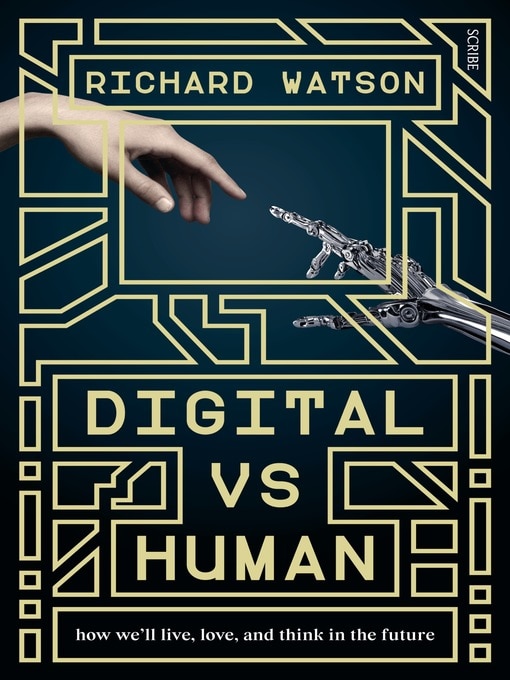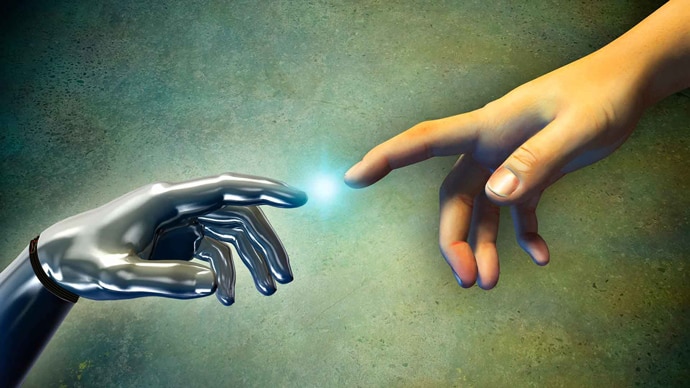Digital vs human: Is the soul a software?

I have few fixed beliefs. I agree with the author George Zarkadakis that without words, there would be no universe and no reality, which some people might align with The Book of Genesis. The world came into being when we found the words to describe it. I believe in the unseen, and I think it’s possible that an immaterial human soul, or spirit, exists that is somehow eternal — a separation of body and soul. This is reminiscent of computer software being separate from computer hardware.
I think it’s possible, too, that materials can hold memories of energy or events linked to people — ghosts, if you like — which has parallels with how some children think objects have minds and with how Australian Aboriginals view their landscape.
I also believe it’s possible that parallel universes exist, which some people might interpret as heaven and hell. If one day we invent communication between human brains via thought (neuro telepathy) then perhaps we’d have a prayer. If we artificially create consciousness and place our thinking selves in boxes, we would even have the true separation of body and soul.
Of course, our existence and that of the entire universe could be a Matrix-like simulation, as I mentioned earlier. The American physicist Silas Beane even thinks this is statistically probable. Whatever the shape of things to come, it’s certainly the case that alien intelligence out in space or artificial intelligence here on Earth will create questions about the individual self and what it means to be human. Artificial intelligence, in particular, is a mirror that we will use to ask questions about ourselves that reveal our true nature.
Historically, asking such questions was the role of religion. Religion provided a sense of community, a shared moral code, and ultimately a purpose. It also provided a narrative that explained the human experience. For some, religion still does this and more. But for others, religious faith is akin to a belief in horoscopes.
The drift away from religion was predicted by Max Weber and Emile Durkheim a century ago. The theory back then was that the expansion of scientific logic would lead to the elimination of God, as religion rested on human ignorance.

One might argue that this is exactly what’s happened. The internet is merely following in the footsteps of the printing press and other forms of mass media as the latest way in which knowledge is spread and a new communal consciousness emerges.
In the West, many adults now claim not to believe in God, although in lots of cases it seems to be more that they can’t be bothered (or don’t have the time) rather than an active consideration and rejection. Non-belief can also be seen an offshoot of individualism, whereby people no longer wish to be told what to think or how to behave.
In the United States, often quoted as the exception to the secularisation rule, there’s also been a fall in belief, with 20 per cent of Americans expressing no belief, compared to 5 per cent in 1970. Generationally, the fall is even steeper.
Younger generations tend to believe in Steve Jobs and tablet computing, not "The Book of Job" or the "Tablets of Stone". However, the future is rarely at the end of a trend line, and historical data is a poor guide to what will be conceived or resurrected in the future.
Moreover, worldwide, religion is in fine fettle. In Russia, China, and Africa, religion is resurgent. Globally, 59 per cent of people describe themselves as religious, while in China there are 80 million active Christians, which makes the Church larger than the Communist Party. This could be due to suppressed demand or it might be that digitalisation has enabled the opposite of what was generally anticipated.
The easy transmission of faith, ranging from streamed church services and Instapray (an app that allows people to request prayers) to text-based confession, has led to booming belief. No doubt we’ll see more ways to interact with the dead at some point in the future.
There’s also the thought that religion thrives when people wish to measure their pain. Religion is popular where people are poor or insecure, but weak in relatively rich regions such as Scandinavia, where social safety nets are strong.
There are further factors at play, too. Societal ageing is creating more elderly people with an interest in what, if anything, happens after they die. Geopolitical turmoil, economic volatility, and technological change have similarly conspired to create a world defined by complexity, rapid change, and uncertainty. In this context, God is intuitively appealing.
Religion explains why things are as they are and describes what comes next. Furthermore, while God may be on the way out in Europe, even here most people believe in something. Theos, a British think tank, says that although many might not believe in God specifically, around 60 per cent of adults in the UK profess spiritual or supernatural beliefs or believe in some form of higher power, while only 13 per cent of people think human beings have no spiritual element whatsoever. When people stop believing in God, they believe in nothing.
On one level, many people feel that they have lost a sense of control, creating anxiety. But, as I said earlier, the solution might be to acknowledge that we aren’t in control and that randomness and elements derived from chance encounters play a huge part in how things turn out. Embracing such thoughts is hugely liberating.
As my torn-out article from The Atlantic puts it: ‘Throw that master switch and feel the relief spread through your mind and body … feel the freedom of no longer needing to make anything happen’. Taken to an extreme, this is fatalistic, even nihilistic, but it does have its practical uses.

Stone Age shadows
Going back to our Stone Age brains, it may be because we lived in constant fear of danger that we developed the idea that something ‘out there’ was either after us or looking after us. Even today, the thought that there’s someone watching over us makes sense, because it can remove existential fear. I will leave further musings on our search for meaning and the meaning of machines for the final chapter. However, before I do this, I would like to briefly examine war, violence, and art, and what each of these may tell us about the human condition.
Some people might argue that without religion, there would be no wars. I imagine that war will continue, but there could be fewer instances of large-scale conflict in the future because most societies are ageing, and older people tend not to fight each other. As an illustration of this thought, the median age in Afghanistan is 15.6, in Gaza is 18, in Syria is 21.9, and in Egypt is 24.4. Contrast this to the US, where the median age is 37.1; the UK, where it’s 39.8; and Japan, where it’s 44.9.
Clearly, in Japan, and increasingly elsewhere, a large proportion of the population is more worried about getting out of bed without falling over than toppling governments. Of course, the digitalisation of war means this may no longer hold true. With hand-to-hand combat, youth is an advantage, but it’s less of one in wars waged digitally. A pertinent question might, therefore, be how the growing convergence between computer games and real warfare will affect our sense of reality and whether a generation brought up playing increasingly lifelike war games will more readily go to or accept war.
Using games to simulate war isn’t new. The difference this time is scale. The game Call of Duty: Modern Warfare 2 earned $310 million in sales within one day of release. Compare this to the blockbuster movie Star Wars: The Force Awakens, which racked up $119 million in its first day.
Or how about the fact that while 70,000 young people joined the US Army in 2009, more than 4.7 million stayed at home on Veterans Day to play war games on computers. Worldwide, the war-game genre is possibly the most significant sector of the gaming market, and it is estimated that there are more than 350 million regular players of such video games worldwide.
But there are consequences. One is that, the more realistic digital games become, the greater the distortion between reality and fantasy. Clearly, virtual exercises are the way to go if military budgets are constrained or you wish to avoid casualties associated with boots on the ground. Yet is there a danger that digital training will edge out real-life understanding?
Moreover, are young men brought up playing Assassin’s Creed going to feel less guilt if they kill someone in the real world using a virtual interface? In other words, does virtual war desensitise combatants in real theatres of combat? The argument here is that virtual violence means that war feels less real and therefore that the perpetrators of real-life violence feel less empathetic toward their victims.
And if this is true, imagine, for a moment, what happens if Disney and the Department of Defence teamed up to fight ISIS using 3D glasses, haptic gloves, and scent collars that create microbursts of cordite? I imagine the answer might include weakened situational awareness followed by disconnection from reality and risk.
Perhaps people playing war games will retain a sense of what’s right and wrong, yet become more afraid of reality. In other words, on-screen violence might not make society more violent, but it may increase the expectation of violence.
On a more positive note, Olivia Metcalf at the Australian National University suggests that such games ‘provide an escape from purposelessness’. However, is the disappearance of war at the cost of millions of disillusioned and disenfranchised minds a price we are prepared to pay?
(Excerpted with publisher's permission.)

